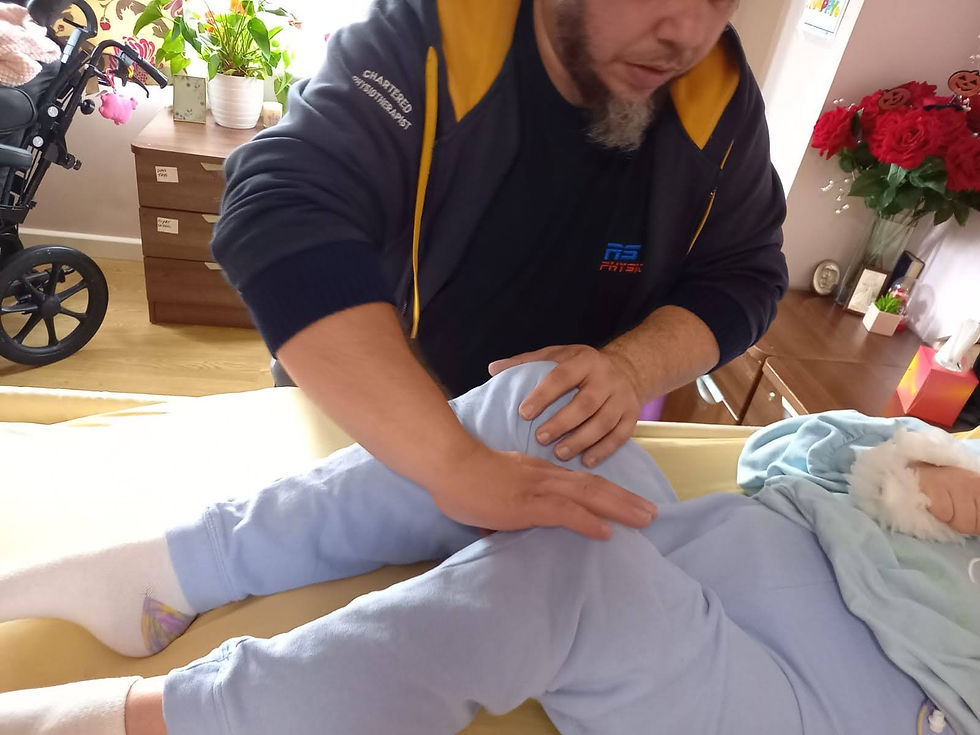Why Should Physical Therapists Care about Their Patients' Diet?
- Pawel Ciecierski MSc Physiotherapy MCSP HCPCreg

- Sep 20, 2021
- 3 min read
Updated: Aug 4, 2024

As a physiotherapist, my top priority is to offer holistic care that takes into account all the factors influencing your health and well-being. While exercise plays a key role in rehabilitation, the impact of diet is equally important. Let’s dive into how diet and exercise together can significantly enhance your rehabilitation journey.
The Connection Between Diet and Exercise
Countless studies have shown that diet and exercise are closely linked, both playing essential roles in our overall health. The food we eat provides the energy and nutrients needed for our bodies to function properly. When we exercise, our energy needs increase, so it’s crucial to fuel ourselves with the right nutrients. Ensuring your body gets what it needs is essential for both performance and recovery.
According to research by Brouns (2018), nutrition and exercise are interdependent. The right diet not only powers physical activity but also helps with recovery, tissue repair, and muscle growth. This means that what you eat directly affects how well you can participate in and benefit from your rehabilitation exercises.
The Impact of Diet on Chronic Conditions
What we eat has a significant effect on the risk and management of chronic conditions like type II diabetes, high blood pressure, and heart disease. Bassuk and Manson (2005) found that combining physical activity with a balanced diet can greatly reduce the risk of these diseases. A nutritious diet helps manage and lower the risk of these conditions, thereby boosting the effectiveness of physiotherapy.
As we work together in your rehabilitation sessions, it’s important to remember that your body needs the right nutrients to rebuild tissues, including muscles and brain cells. A well-balanced diet supports your overall health and maximizes the benefits of our physiotherapy sessions.
How Diet Affects Rehabilitation
When you’re going through rehabilitation, good nutrition becomes even more crucial. Proper diet aids in tissue repair, reduces inflammation, and supports the body’s healing process. For example, getting enough protein is essential for muscle recovery and repair, especially for patients recovering from injuries or surgery. Research by Astrup et al. (2002) underscores the importance of protein in muscle health and energy expenditure.
Keeping a healthy weight is also key to successful rehabilitation. Excess body weight can put extra strain on joints and muscles, slowing progress in therapy. By encouraging a balanced diet, we can improve outcomes and ensure you get the best results from our sessions.
Seeking Professional Dietary Guidance
While I can offer general advice on diet’s role in exercise and rehabilitation, it’s important to recognize the expertise of registered dietitians. These professionals are trained to assess individual dietary needs, create personalized nutrition plans, and address any medical conditions that might affect your dietary choices.
Everyone’s dietary needs are different, and personalized guidance from a registered clinical dietitian can help you make informed decisions that positively impact your health and well-being throughout your physiotherapy journey.
A Holistic Approach to Recovery
Your condition affects not just your body but also your emotions and daily life. Addressing the emotional impact is crucial, and considering counseling or joining support groups can offer valuable emotional support. Combining physical therapy, a balanced diet, and emotional support forms a well-rounded recovery plan that addresses physical, emotional, and social rehabilitation.
If you ever feel isolated or overwhelmed, remember that support networks are available. Connecting with support groups can link you with others facing similar challenges, providing strength and perspective.
Effectively managing your diet and exercise regimen is vital for improving mobility and overall function. By combining physiotherapy, a balanced diet, and emotional support, you can achieve better muscle control, reduced stiffness, and increased range of motion.
Keep in mind that everyone’s rehabilitation journey is unique. Patience, persistence, and active participation in your treatment plan will greatly influence your recovery. Stay positive, seek professional advice, and embrace the challenges ahead. Together, we can work towards a healthier, more active, and fulfilling life.
References:
1. Brouns F. (2018). Nutrition and Exercise. In: Hargreaves M., Thompson P. (eds) Exercise Metabolism. Springer, Cham.
2. Bassuk S. S., Manson J. E. (2005). Epidemiological Evidence for the Role of Physical Activity in Reducing Risk of Type 2 Diabetes and Cardiovascular Disease. Journal of Applied Physiology, 99(3), 1193-1204.
3. Astrup A., et al. (2002). Effect of Short-Term High vs. Low-Protein Diet on 24-Hour Energy Expenditure, Urinary Nitrogen Excretion, and Respiratory Quotient. International Journal of Obesity and Related Metabolic Disorders, 26(10), 1308-1316.
4. Dehghan M., et al. (2012). Associations of fats and carbohydrate intake with cardiovascular disease and mortality in 18 countries from five continents (PURE): a prospective cohort study. The Lancet, 390(10107), 2050-2062.





Comments